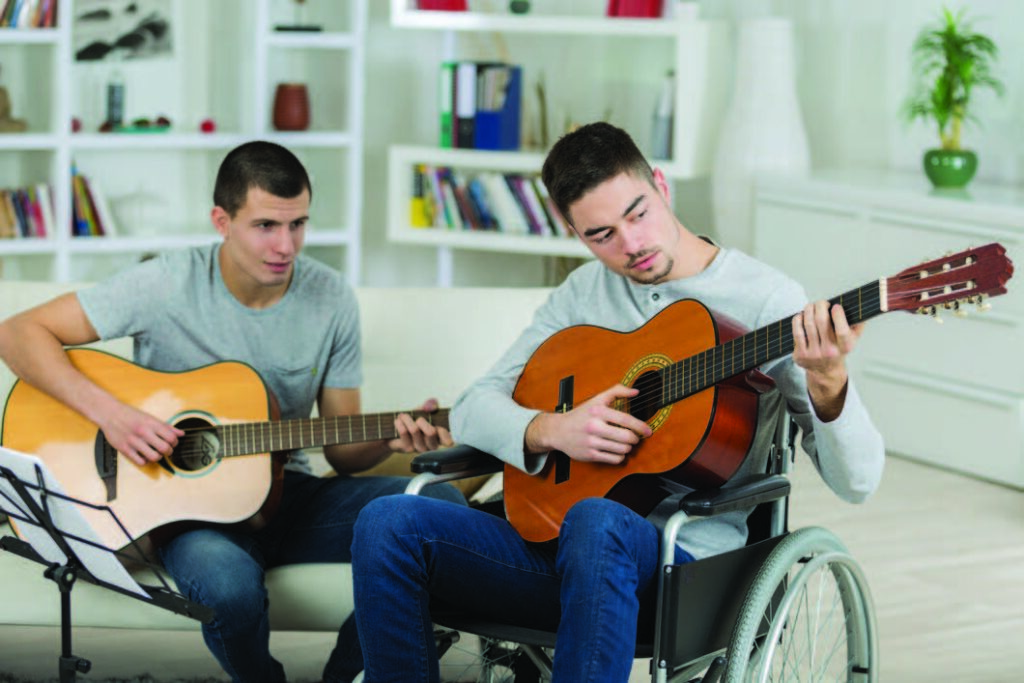Thanks to an ongoing partnership with the National Music Centre/Studio Bell, JB Music Therapy and the generous support of our community, we’ve made it possible to provide life-changing experiences for patients through music therapy in our hospitals.
Prior to the pandemic, music therapists were providing in-room patient therapy in several units within the Foothills Medical Centre (FMC) and South Health Campus (SHC), including neuro rehab and stroke, palliative and mental health, and ICU. During this pandemic, when the restrictions prevented in-person therapy, our music therapists were able to work with the onsite Alberta Health Services (AHS) care team to deliver online music therapy to Albertans who were the hardest hit by the COVID-19 pandemic. Some of the ICU patients who needed to be hooked up to ventilators to help them breathe were provided their favourite music as comfort, oftentimes while in isolation. Patients who were unable to speak made requests by pointing. Music therapists report that patients showed their appreciation through eye contact, smiling, and nodding while listening.
Thanks to the National Music Centre, we are utilizing the healing power of music to enhance our pillars of health: care, wellness and research.
CARE:

Many patients receiving palliative care find it difficult to have real emotional release following their diagnosis. Most of the conversations surround the medical and technical elements of their illness. Music therapy sessions give families and loved ones the opportunity to interact with each other in a meaningful and less awkward way that doesn’t involve words.
One palliative care patient was having difficulty finding the words to express to her mother how much she meant to her. One day, as the music therapist visited, the patient was able to dedicate a song to her mom as a way to relay the love and appreciation she had for her during her end-of-life transition. Her mother reached out to the music therapist after her daughter passed to mention how much that had meant.
Music therapy gives people the emotional and physical space to release what they’re feeling and processing and makes space for meaningful communication amongst families, loved ones and therapists.
WELLNESS:
AHS Patient and Family Centered Care, The Instrumental Society of Calgary and Asylum for Art, formed a collaboration to put on a virtual concert series, Winter Solace for patients, families and healthcare professionals throughout Calgary Zone and indeed beyond. 20 performances were offered online for free December 2020-March 2021 and featured a variety of genres and cultural musical styles. The goal was to provide comfort and connection for healthcare workers and patients and to provide employment for local musicians. The series was supported by a grant from the Calgary Foundation and can be viewed at www.wintersolace.ca.
RESEARCH:
In addition to the impact that music therapy is having in acute care situations, incredible advancements are being researched right here in Calgary. This research is showing the correlation between music therapy and an improved healing journey. We are currently supporting a number of University of Calgary studies happening on the topic of music therapy, including:
A paper entitled “Scoping Review of Music Therapy and Music Interventions in Spinal Cord Injury” that is currently awaiting peer review.
Current research:
Plamondon S, Grant C, Debert C, Dukelow SP, Mercier L. Integrating music therapy into neuro-rehabilitation for improved patient experience and outcomes: a QI project. Archives of Physical Medicine and Rehabilitation. 2020;100(12):e185
American Congress of Rehabilitation Medicine Annual Scientific Meeting, November 2019. (re-presentation of data).
11. Scholz N, Plamondon S. Knowledge in translation: real world implementation of rhythmic auditory cueing to improve gait in stroke inpatient rehabilitation. Archives of Physical Medicine and Rehabilitation. 2020;101(12):e143
American Congress of Rehabilitation Medicine Annual Scientific Meeting, October 2020.
12. Plamondon S, Wright P, Leavitt K, Rashead M, Viala S, Aiello K, Zingelar M, Dollimont J, Wood M, Robinson S. Telepresence robot usability to deliver music therapy and peer-support for inpatients in neuro-rehabilitation during the COVID-19 pandemic. The Journal of the International Society of Physical and Rehabilitation Medicine. 2021;4(1):S53-S54. International Society of Physical and Rehabilitation Medicine Virtual Annual Scientific Meeting June 12-15, 2021.

At Foothills Medical Centre on the acute neuro and spine unit – music therapy continues to provide a similar boost to morale for staff and patients experiencing prolonged isolation and burnout. The music floating down the hallways provides something new and different – and staff and patients report their ongoing appreciation for the sound of music and the changes it can bring to the unit even once a week.
One of the patients on this unit had experienced extensive trauma around both their injury and recovery – with multiple surgeries and moving back and forth between acute care and ICU. The patient is a music lover and hobby musician – who shared with the music therapist that one of his favorite instruments to play is the harmonica. The patient has had ongoing difficulty with breathing post tracheostomy along with excessive phlegm and has needed ongoing support with coughing. To support the patient with recovering diaphragmatic strength, decreasing phlegm, and improving breath support the music therapist introduced respiratory rehabilitation training using the harmonica.
Each week the patient plays either on the tilt table or seated in the patient’s chair while playing along to familiar music. The patient can now play standing for 25 minutes and seated for 18 minutes. The patient – while having reported extremely low mood throughout admission – smiles, laughs, and jokes throughout sessions with the music therapist and staff. The patient is incredibly musical and expressive – and working HARD to produce sound on this instrument as the air is drawn both in and out to create the melodies and rhythms he desires. The patient’s stamina and the volume of the voice as well as ability to cough post sessions has continued to improve each week. The goal is to improve both the breathing and inspiratory volume, decrease physical stress around phlegm and low blood pressure (an ongoing problem for this patient) – while also focusing on the psychological benefits including increased satisfaction and mood. Improvements in all of these areas have been reported by both the patient and nursing staff.
Your contributions to the Calgary Health Foundation make it possible for the healing power of music to continue to benefit people during one of the worst medical crises in our history. Thank you.
For more, watch Music therapists promote well-being – YouTube.
The National Music Centre is hosting drop-in music therapy sessions every Saturday at Studio Bell until June 11, 2022. Learn more here.


